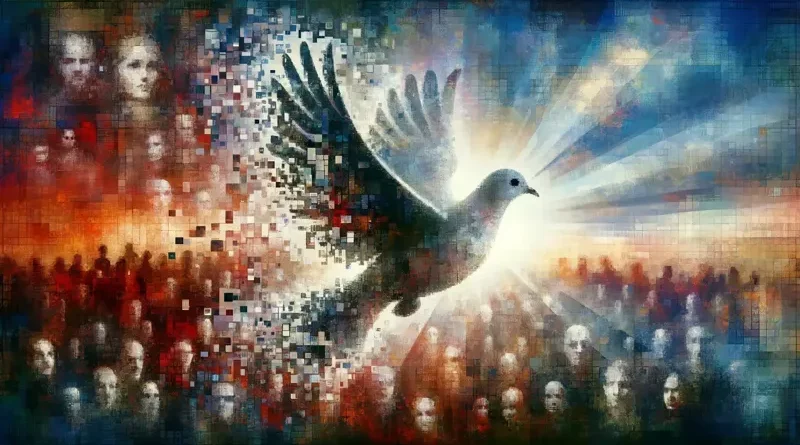Digital Eyes on Gaza: The Unfiltered Lens of Social Media on Conflict and Compassion
A New Window to an Age-Old Conflict
The conflict in Gaza has long captured the world’s attention, but the emergence of social media has magnified its impact. Platforms teeming with user-generated content provide a raw, unedited look into the realities of life and strife in this region. The narrative of conflict now unfolds in real-time, narrated by the very people who live it.
The Roots of Unrest: A Brief History of the Gaza Conflict
The Gaza Strip’s history is a complex chronicle of occupation, conflict, and resistance. This narrow piece of land has been the subject of dispute for over a century, with significant events shaping its current state. Understanding this context is crucial to comprehend the depth of the issues presented on social media today.
The Rise of Social Platforms: News in the Age of Hashtags
The last decade has seen a seismic shift in news dissemination. Social media has given rise to a new form of journalism, one that’s immediate and personal. It has empowered citizens to share their experiences directly with a global audience, turning hashtags into rallying cries and personal accounts into front-page news.
The Gaza Narrative: Social Media as the New Frontline
In Gaza, the smartphone is as powerful as the gun, with social media serving as a new frontline. Platforms have been instrumental in shaping the conflict’s narrative, providing a megaphone for voices that might otherwise go unheard. They highlight the human cost of the conflict, showing the world the faces behind the figures.
Riyadh Summit: A Recent Diplomatic Effort
The recent summit in Riyadh brought leaders together to discuss pressing Middle Eastern issues, including the Gaza situation. This diplomatic gathering, trending across social media platforms, showed the international community’s recognition of the need for dialogue and resolution. The summit’s outcomes and discussions were live-tweeted, blogged, and debated, demonstrating the role of digital platforms in shaping political discourse.
Global Engagement: Humanity’s Response Through the Digital Mirror
As the summit unfolded, the world watched and responded in real-time. International solidarity with Gaza has been amplified through campaigns and viral content. The global village has never been more evident, with digital activism pushing for political change and humanitarian aid.
Beyond the Screen: Humanizing Conflict in the Digital Realm
Amidst this, social media faces the challenge of humanizing a deeply politicized issue. The personal stories shared online do more than just inform; they evoke empathy and understanding, bridging gaps across cultures and borders. Yet, the question remains: does this empathy translate into action, or does it dissolve into the passive engagement of slacktivism?
Navigating the Digital Minefield: Challenges of Online Discourse
The digital landscape is fraught with misinformation and bias. The immediacy of social media, while a boon for awareness, also presents a risk of spreading unverified information. The echo chambers within these platforms can distort the reality of the situation, necessitating a discerning and critical approach to digital content.
The Call Beyond the Clicks
The digital narrative of Gaza, richly woven with the threads of humanity and political discourse, is more than a series of fleeting moments captured online. It’s a testament to the power of modern communication and its potential to drive change. The summit in Riyadh, much like the conflict in Gaza, reminds us that behind every tweet, post, and share, there is a human story and a call for action. As global citizens, it is our responsibility to heed that call, moving beyond passive digital consumption to informed and compassionate engagement.
Embracing Action Beyond Digital Compassion
The digital portrayal of Gaza invites a complex interplay of emotions and responsibilities. Each byte of information serves not only as a testament to the resilience and suffering of its people but also as a clarion call to the global community for meaningful engagement. The recent summit in Riyadh has shown that diplomatic efforts, when combined with the public pressure created through social media, can pave the way for dialogue and potential resolutions.
Yet, the true test lies not in the digital empathy evoked by a tweet or a post but in the concrete actions that follow. As the world watches and reacts to the situation in Gaza through screens, the challenge is to translate online solidarity into offline support – be it through policy change, humanitarian aid, or simply a sustained awareness that refuses to let the plight of Gaza fade into the background noise of the digital age.
As we add to the narrative with each share, like, and comment, let’s remember the power we wield with our digital devices. Let’s use that power to not just view or comment, but to act and inspire action that transcends digital borders and brings about real-world change.

